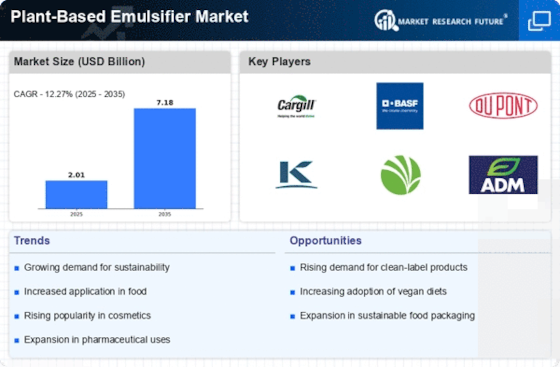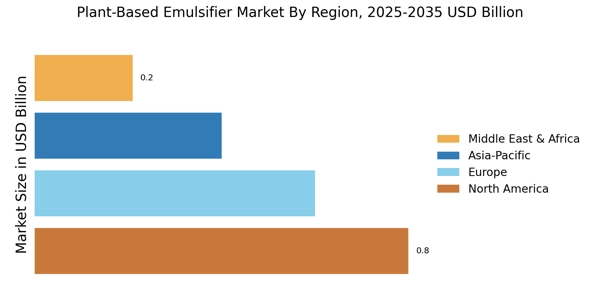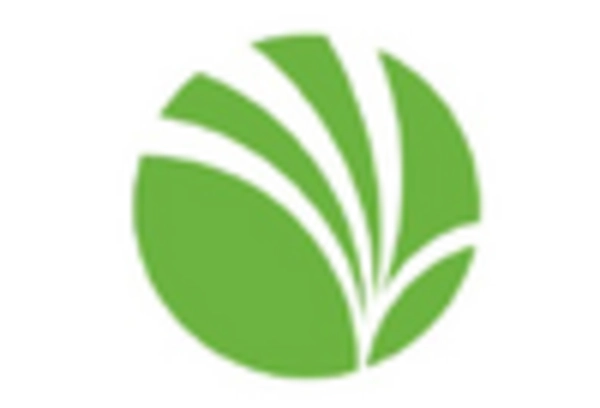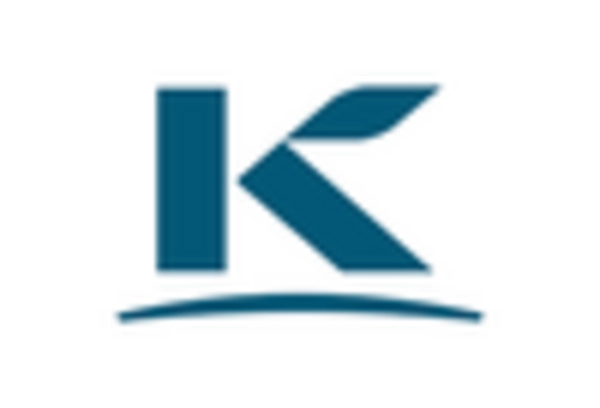Rising Health Consciousness
The increasing awareness of health and wellness among consumers appears to be a pivotal driver for the Plant-Based Emulsifier Market. As individuals become more informed about the benefits of plant-based ingredients, they are likely to seek alternatives to traditional emulsifiers derived from animal sources. This shift is reflected in market data, which indicates a growing preference for products that promote better health outcomes. The demand for clean label products, which often feature plant-based emulsifiers, is on the rise, suggesting that consumers are gravitating towards transparency in food labeling. Consequently, manufacturers are responding by reformulating their products to include plant-based emulsifiers, thereby enhancing their market appeal and aligning with consumer preferences.
Consumer Preference for Ethical Products
The growing consumer preference for ethical products is significantly influencing the Plant-Based Emulsifier Market. As consumers become more conscious of the ethical implications of their food choices, they are increasingly opting for products that align with their values. Plant-based emulsifiers, which are often perceived as more humane and ethical compared to animal-derived alternatives, are gaining traction among this demographic. Market data suggests that a substantial segment of consumers is actively seeking out products that reflect their ethical beliefs, thereby driving demand for plant-based emulsifiers. This trend is prompting manufacturers to highlight the ethical aspects of their products, further enhancing their market positioning. As the emphasis on ethical consumption continues to rise, the plant-based emulsifier segment is likely to experience sustained growth.
Sustainability and Environmental Concerns
Sustainability has emerged as a crucial factor influencing consumer choices, particularly in the Plant-Based Emulsifier Market. As environmental concerns escalate, consumers are increasingly inclined to select products that minimize ecological impact. Plant-based emulsifiers, often derived from renewable resources, present a more sustainable alternative to synthetic or animal-based emulsifiers. Market data indicates that a significant portion of consumers is willing to pay a premium for products that are environmentally friendly. This trend is prompting manufacturers to innovate and incorporate plant-based emulsifiers into their formulations, thereby addressing both consumer demand and regulatory pressures for sustainable practices. The emphasis on sustainability is likely to continue shaping the market landscape in the coming years.
Regulatory Support for Plant-Based Ingredients
The regulatory environment is becoming increasingly favorable for the Plant-Based Emulsifier Market. Governments and regulatory bodies are recognizing the importance of plant-based ingredients in promoting public health and sustainability. This support is evident in the formulation of policies that encourage the use of natural and plant-derived emulsifiers in food products. Market data suggests that regions with stringent regulations on artificial additives are witnessing a surge in the adoption of plant-based emulsifiers. As regulations evolve, manufacturers are likely to adapt their product lines to comply with these standards, thereby driving growth in the plant-based emulsifier segment. This regulatory support may also enhance consumer trust in plant-based products, further propelling market expansion.
Technological Advancements in Emulsifier Production
Technological advancements are playing a significant role in shaping the Plant-Based Emulsifier Market. Innovations in extraction and processing techniques are enabling manufacturers to produce high-quality plant-based emulsifiers more efficiently. These advancements not only improve the functionality of emulsifiers but also enhance their sensory attributes, making them more appealing to consumers. Market data indicates that the introduction of novel emulsification technologies is leading to a broader application of plant-based emulsifiers in various food products. As manufacturers continue to invest in research and development, the potential for new and improved plant-based emulsifiers is likely to expand, thereby fostering growth in the market. This technological evolution may also facilitate the entry of new players into the market, increasing competition and driving further innovation.


















